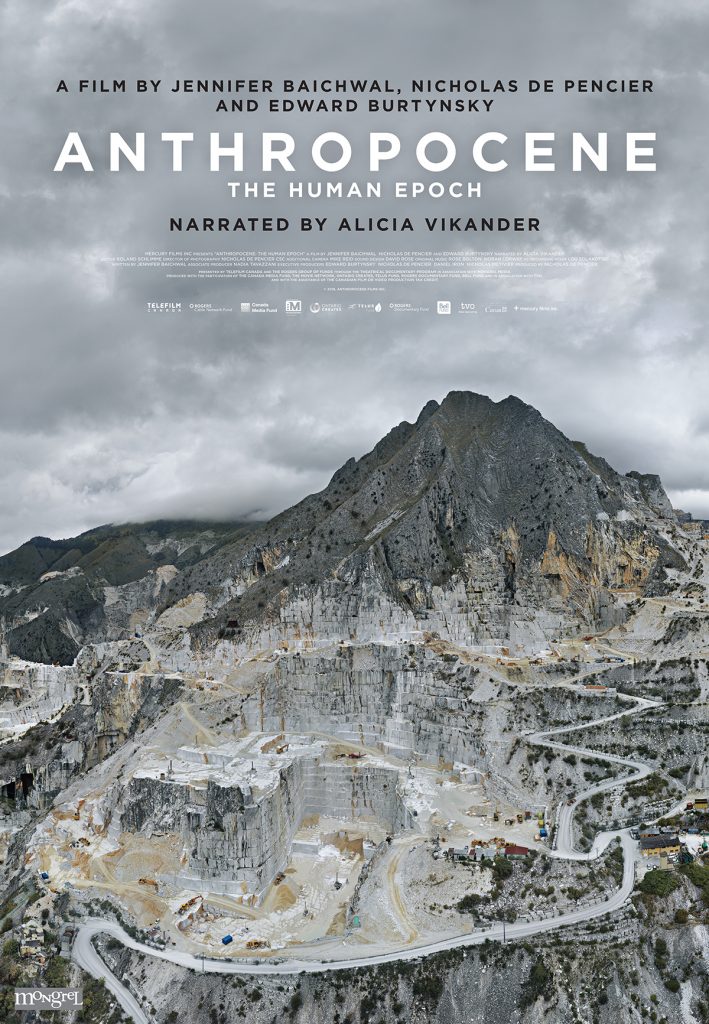A cinematic meditation on humanity’s massive reengineering of the planet, ANTHROPOCENE: The Human Epoch is a four years in the making feature documentary film from the multiple-award winning team of Jennifer Baichwal, Nicholas de Pencier and Edward Burtynsky.
Third in a trilogy that includes Manufactured Landscapes (2006) and Watermark (2013), the film follows the research of an international body of scientists, the Anthropocene Working Group who, after nearly 10 years of research, are arguing that the Holocene Epoch gave way to the Anthropocene Epoch in the mid-twentieth century, because of profound and lasting human changes to the Earth.
From concrete seawalls in China that now cover 60% of the mainland coast, to the biggest terrestrial machines ever built in Germany, to psychedelic potash mines in Russia’s Ural Mountains, to metal festivals in the closed city of Norilsk, to the devastated Great Barrier Reef in Australia and surreal lithium evaporation ponds in the Atacama desert, the filmmakers have traversed the globe using high end production values and state of the art camera techniques to document evidence and experience of human planetary domination.
At the intersection of art and science, ANTHROPOCENE: The Human Epoch witnesses in an experiential and non-didactic sense a critical moment in geological history — bringing a provocative and unforgettable experience of our species’ breadth and impact.
What is eco-anxiety?
Although it is a neologism, the term “eco-anxiety” has already carved out a significant space in the timetables of psychologists around the world and, of course, in some people daily lives. Natural disasters, which are becoming more frequent and more extreme as a result of climate change have caused many people to suffer from eco-anxiety without even knowing what it is.
Causes of eco-anxiety
Eco-anxiety is not considered a disease, at least not yet, but the heightened concern about the climate emergency we are experiencing can lead to psychological disorders. The American Psychology Association (APA) describes eco-anxiety as “the chronic fear of environmental cataclysm that comes from observing the seemingly irrevocable impact of climate change and the associated concern for one’s future and that of next generations”. The APA, therefore, considers that the internalisation of the great environmental problems that affect our planet can have psychological consequences of varying seriousness in some people.
How eco-anxiety affects people
Eco-anxiety does not affect everyone equally. In fact, it tends to be more prevalent among people who are more aware about the protection of the environment. The symptoms include the following: slight cases of anxiety, stress, sleep disturbances, nervousness, etc. In the more serious cases, eco-anxiety can cause a sensation of suffocation or even depression. Among the latter group, it is quite common for people to express a strong sense of guilt about the situation of the planet, which can be aggravated, among those who have children, when thinking about their future.
Eco-anxiety with the TransitieCinema experts panel
The documentary “Anthropocene”, an award-winning film that highlights how we as humans are currently shaping the Earth, will be followed by our experts panel (members to be announced) to discuss the effects our environmental impact on the mental health of our society and the eco-anxiety phenomenon.
